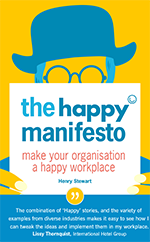What If the Boss Makes No Decisions?
As a manager, do you see your role as the expert, with responsibility for making key decisions? Do you find your people coming to you for those decisions, even when they know what to do?
Hi, we are Happy
We are leading a movement to create happy, empowered and productive workplaces.
How can we help you and your people to find joy in at least 80% of your work?

In one big British retailer they tried an experiment, asking the store managers in two locations to make no decisions for three months. Termed Project Maverick, in honour of Ricardo Semler, the managers of the stores were asked to instead help and coach their people to come to their own decisions.
The result: On seven crucial KPIs, the results went up – in absolute terms and in relation to other stores.
From tell to do the right thing
“We wanted to transform an environment which was quite directive into one where people do the right thing,” explains Donna Reeves, who was then Director of Group Internal Comms and worked with the team on the project. “We recruit really smart people, full of ideas and enthusiasm. Then we put them in a uniform and start telling them what to do.”
The two store managers were given coaching training and support throughout the project and they in turn coached their teams. There were very few rules: follow any centrally-dictated process, keep everyone safe and you can’t make any decisions – you’re going to coach your teams to make decisions themselves.
“We asked them to start by getting up in front of team and explain that things were going to be different, which meant being vulnerable, putting themselves out there in front of their teams,” continues Donna.
The managers were really up for it
“These were people who had been store managers for around 25 years each. They knew how to run their stores and get things done, often in quite a traditional way. But they were really up for it.
“When people come and say ‘boss, that problem we’ve got, we could do X or we could do Y. 90% of the time they know the right answer: We go to our boss for answers because we want reassurance and often because it means they make the decision, so it’s not my responsibility.
“In the 10% where people don’t know the answer, there’s an opportunity to coach them. Either way, if they’re right, that’s great, and if they get it wrong, that’s an opportunity for another great coaching conversation, to get great learning.”
The managers really enjoyed the experience; they were more relaxed and felt that the world was no longer solely on their shoulders. Even the families of the store managers noticed the difference. One asked what was going on, as he was so much more relaxed when he came home. He didn’t have this weight on his shoulders any more. And, when he had a week off, he didn’t contact the store.
“You’ve got a lot more trust behind you”
One member of staff said, “the shackles have been released from everybody. You’ve got a lot more trust behind you. You can make the decision with the customer. The customers know that we can make our own decisions. A lot more staff have the autonomy to do what they believe is right.”
In both stores the managers continued when the three-month pilot came to an end. “Why on earth would you want to go back? It’s a great place to be. It puts cash in the till and earns people a bonus. And they’re feeling great coming to work in the morning.”
As a manager could you make no decisions?
This example reminds me of the story of David Marquet. As Captain of the submarine Sante Fe, he resolved to make no decisions (except for the key one to fire torpedoes at an enemy) and turned it into the best performing submarine in US Navy history.
Are you a manager? Do you see your role as to be the expert and make the key decisions – or to make as few decisions as possible and coach and support your people to take action?
Keep informed about happy workplaces
Sign up to Henry's monthly Happy Manifesto newsletter, full of tips and inspiration to help you to create a happy, engaged workplace.

Learn the 10 core principles to create a happy and productive workplace in Henry Stewart's book, The Happy Manifesto.
Henry's Most Popular Blogs
- 8 Companies That Celebrate Mistakes
- 9 Benefits of Having Happy Employees
- 321Zero: How I Solved my Email Overload
- 16 Companies That Don't Have Managers
- 5 Big Companies Who Swear by Mindfulness
- 49 Steps to a Happy Workplace
- A Four Day Week? Let's Start With a Four Day August
- Google: Hire Great People and Give Them Lots of Autonomy
- Buurtzorg: No Managers, Just Great Care From a Nurse-Led Service
- 30 Steps to Joy at Work: Get More Done by Being Less Busy

Henry Stewart, Founder and Chief Happiness Officer
Henry is founder and Chief Happiness Officer of Happy Ltd, originally set up as Happy Computers in 1987. Inspired by Ricardo Semler’s book Maverick, he has built a company which has won multiple awards for some of the best customer service in the country and being one of the UK’s best places to work.
Henry was listed in the Guru Radar of the Thinkers 50 list of the most influential management thinkers in the world. "He is one of the thinkers who we believe will shape the future of business," explained list compiler Stuart Crainer.
His first book, Relax, was published in 2009. His second book, the Happy Manifesto, was published in 2013 and was short-listed for Business Book of the Year.
You can find Henry on LinkedIn and follow @happyhenry on Twitter.
Next Conference: Women in Leadership Online Conference
Save the date for our online conference on 12th November 2025, celebrating women in leadership.
You will hear from inspiring female leaders about how they have created happy and empowered workplaces.
There will be interaction, discussion, space for reflection and opportunities to network with other leaders.
Related courses
The Happy Leadership Programme
Brave Leadership: One-Year Leadership Development Programme for Women
Level 7 Senior Leadership Apprenticeship Programme
Not what you need? Take a look at all of our off-the-shelf Leadership and Management programmes.